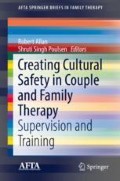Abstract
Traditionally, counselor education programs offer a single multicultural (MC) course. Multiple courses or inclusion of MC information across the curriculum are preferred over the “one course” model; however, the “multiple courses” model is onerous on a program’s credits, and in the “inclusion” model, the degree and uniformity of MC material is difficult to coordinate and guarantee across courses. The authors will describe a curriculum that combines the one course and infusion models to deliver comprehensive MC training in a counselor education program. This curriculum includes MC self-awareness Labs aimed at raising students’ consciousness of the role that their identities play in interpersonal dynamics, and therefore, in clinical work. The paper will describe briefly the overall structure of the curriculum, and in more detail, the MC self-awareness Labs. The authors will highlight the importance, when it comes to MC pedagogy, of not simply conveying content, but also facilitating a transformative process.
Access this chapter
Tax calculation will be finalised at checkout
Purchases are for personal use only
Notes
- 1.
The second author is the director of the program in question and the first author was hired to develop and deliver the multicultural self-awareness labs based on the goals laid out by a committee from the department.
- 2.
The labs are attached to the courses institutionally just as chemistry labs are attached to chemistry courses, with the same cost to students (no additional cost), resources committed to the department by the institution, and requirement of completion for advancement in the program.
- 3.
The student quotes used in this chapter come directly from their final papers. All students have given their permission for the quotes to be shared anonymously.
- 4.
Each student receives four scraps of paper and they are invited to write on one paper the religion they grew up with (or didn’t) and the religion they practice now (or don’t). On the remaining three sheets, they are invited to write three different feelings—and some explanation of those feelings—that they have about religion. These papers are then put into a basket, and mixed up. Each student draws and reads four papers aloud, and in doing so, we have the basis for a beginning conversation on our feelings and experiences with religion, based on the anonymous sharing of our own experiences.
- 5.
The concept of “tracking” has been passed down to the first author through facilitation mentors such as Sarah Halley and Frederick Bryant. To the best of our knowledge, it comes from a well-known activist and facilitator named Elsie Y. Cross, founder and director of Elsie Cross and Associates.
- 6.
Lorraine Marino developed the ISI awareness tool based on the Pathwork teachings of Eva Pierrakos and the 50–50 work of Moira Shaw. For the labs, the questions have been modified to relate to counseling. They are these: (1) What is your Idealized Self Image (ISI), particularly as a person studying to be a counselor? How do you insist others should see you? (2) What fears and insecurities are underneath your ISI? What does your ISI protect or cover up? (3) What is the core truth in you, the best in you, the core intentions that guide your desire to be a therapist? (4) What is the impact of your ISI on your ability to be a good counselor or therapist? Readers interested in conducting this activity should contact the first author.
- 7.
This experiential aspect of the ISI exercise was developed by Sarah Halley.
- 8.
This quote is often attributed to an aboriginal activist named Lila Watson.
References
Bartoli, E., Bentley-Edwards, K. L., García, A. M., Michael, A., & Ervin, A. (2015). What do white counselors need to know about race? White racial socialization in counseling and psychotherapy training programs. Women & Therapy, 38, 246–262.
Bartoli, E., Morrow, M., Dozier, C. G., Mamolou, A., & Gillem, A. R. (2014). Creating effective counselors: Integrated multicultural and evidence-based curricula in counselor education programs. Journal of the Pennsylvania Counseling Association, 13(1), 27–38.
Blumenfeld, W. J. (2000). How homophobia hurts everyone. In M. Adams, W. J. Blumenfeld, R. Castaneda, H. W. Hackman, M. L. Peters, & X. Zuniga (Eds.), Readings for diversity and social justice (pp. 267–275). London: Routledge.
David-Russell, E. (2003). Integrating multicultural issues into graduate clinical psychology training. In P. Bronstein & K. Quina (Eds.), Teaching gender and multicultural awareness: Resources for the psychology classroom (pp. 339–346). Washington, DC: American Psychological Association.
O’Bear, K. (2016). Turn the tide. Washington, DC: Difference Press.
Rogers, M. R., & O’Bryon, E. C. (2014). Multicultural training models and curriculum. In F. T. L. Leong (Ed.), APA handbook of multicultural psychology, Applications and training (Vol. 2, pp. 659–679). Washington, DC: American Psychological Association.
Project Implicit. (n.d.). Implicit Attitudes Test (IAT).. https://implicit.harvard.edu/implicit/takeatest.html
Ross, H. J. (2014). Everyday bias: Identifying and navigating unconscious judgments in our daily lives. Lanham: Rowman & Littlefield.
Singleton, G. E., & Linton, C. W. (2015). Courageous conversations about race: A field guide for achieving equity in schools. Thousand Oakes: Corwin Press.
Sue, D. W., & Sue, D. (2013). Counseling the culturally diverse: Theory and practice (6th ed.). New York, NY: Wiley.
Williams, E. N., Hayes, J. A., & Fauth, J. (2008). Therapist self-awareness: Interdisciplinary connection and future directions. In D. S. Brown & R. W. Lent (Eds.), Handbook of counseling psychology (4th ed., pp. 303–319). Hoboken, NJ: Wiley.
Author information
Authors and Affiliations
Corresponding author
Editor information
Editors and Affiliations
Rights and permissions
Copyright information
© 2017 American Family Therapy Academy (AFTA)
About this chapter
Cite this chapter
Michael, A., Bartoli, E. (2017). Comprehensive Multicultural Curriculum: Self-Awareness as Process. In: Allan, R., Singh Poulsen, S. (eds) Creating Cultural Safety in Couple and Family Therapy. AFTA SpringerBriefs in Family Therapy. Springer, Cham. https://doi.org/10.1007/978-3-319-64617-6_7
Download citation
DOI: https://doi.org/10.1007/978-3-319-64617-6_7
Published:
Publisher Name: Springer, Cham
Print ISBN: 978-3-319-64616-9
Online ISBN: 978-3-319-64617-6
eBook Packages: Behavioral Science and PsychologyBehavioral Science and Psychology (R0)

